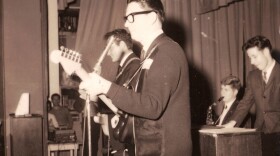Central Texans whose original zip codes are somewhere in Latin America or Spain may be mourning the loss of Argentine singer Gustavo Cerati, who died last week at the age of 55.
In the late ‘80s and early ‘90s, when rock and pop music from the United States and England were the musical standard worldwide, along came Cerati and his band Soda Estéreo.
Take a look back at how they transformed the music industry in a couple dozen Spanish-speaking countries.
There are two doors for Spanish-speaking artists to make it big in Latin America. One is through Spain. But, the biggest audiences are for artists who make it in Mexico. And, one way to make it there is to be discovered by musicologist Martin Hernandez.
That's what happened to Gustavo Cerati and his band Soda Estéreo in 1986. Hernandez says rock and pop artists coming from South America and Spain caused an "invasion" of sorts.
"So, we opened the door to this invasion," he says, "not the British invasion but it was the Spanish-spoken rock invasion and it was very successful."
At the time, Latin American countries were coming out of repressive regimes. The dictatorship was finally over in Argentina. Still, in his poetry, Cerati referred to Argentina's capital city Buenos Aires as "the city of fury."
Mexico was in a slightly better place.
Throughout Latin America, Mexico's one-party democracy was called the "dictatorship with white gloves."
It was not a full-blown dictatorship. But just to paint a picture of the conditions there, Hernandez says, "there were no concerts in Mexico back in the ‘80s." They were simply "forbidden."
Hernandez managed to get Cerati and his band into a host of small venues in Mexico City. They were a big hit with people who had been hearing on the radio only English-language pop from the likes of Michael Jackson and Madonna.
Soda Estéreo had "the same DNA in musical terms," says Hernandez, "but [they] also had the language that [Spanish speakers] needed to understand. So, it was double [the] fun, it was a more natural connection."
In the years that followed, Latin American countries relaxed their rules and Soda Estéreo fans soon counted in the millions.
More than a million people saw Cerati on his last tour with Soda Estéreo in 2007.
With phrases like "cuando pensás el mar, asi te pienso igual," he captured in a few words an idea that could roughly be translated as "when you think what you think about the ocean, that's what I think when I think about you." Or, "recordarte es un hermoso lugar," "bringing you to memory is a beautiful place to be."
After Cerati's split with Soda Estéreo, he had a successful solo career.
In 2010 alone, he won three Grammys.
Music critic Alicia Zertuche says he had such popularity in the United States, that in 2010 she decided to bring him to South by Southwest, but he became ill. Zertuche says news came out that "in a performance in Caracas, Venezuela, he had like a stroke."
Cerati was hospitalized and induced into a coma. He remained in coma for the last four years, until his death Thursday.
Musicologist Hernandez says for fans, Cerati is not dead.
"How can I explain it?" he asks. "To me, he's not gone, he's just stopped suffering. He cannot leave. I mean, Gustavo Cerati is going to be here for as long as mankind is here."
After a concert, Cerati would always thank his fans with a phrase that, even in its original Spanish, sounded a little awkward. He would say "Gracias Totales" or "total thanks."
The phrase was so awkward but meant so much that an entire generation came of age using it. So, in tributes, his fans are now saying back: "Gracias totales Gustavo Cerati, gracias totales."





